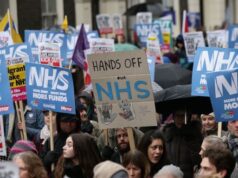Issue: 49
June 2017
This occasional newsletter is researched, written and edited by a group of concerned residents in Ealing, West London who want to preserve our NHS. We view the wholesale engagement of private, for-profit healthcare service suppliers as unnecessary, profligate and dangerous. Increased financial funding is what is needed in our NHS – not financial cuts, closure of vital services or privatisation.
Ealing Tories in Denial About Ealing Hospital Closure
Ealing Central and Acton Conservative candidate Mrs Joy Morrissey recently did a ‘flounce’ and refused to appear at a local General Election hustings. Her reason for her non-appearance was her allegation that Ms Rupa Huq, the incumbent MP, had lied about her in local campaign literature. One of the claimed lies concerns Ealing Hospital. Mrs Morrissey says that the hospital is not closing. Ms Huq says it is. Mrs Morrissey is threatening to sue Ms Huq. Maybe she’ll also sue me for some of what you are about to read.
I first lived in Ealing in 1967. I’ve since lived in Ealing continuously since 1974. Ealing Hospital has been operating since 1992 as an NHS District General Hospital. As such it has offered an A&E unit, trauma care, Emergency surgery, Intensive Care, Obstretrics, Maternity and Inpatient Paediatrics. This service line up lasted for 23 years. However in 2012, the Government/NHS NW London plans (‘Shaping a Healthier Future’ – ‘SaHF’) mandated the closure of Ealing Hospital as a District General Hospital. The closure process on the ground started in 2015 with the closure of Maternity. It continued in 2016 with the closure of In-patient Paediatrics and Children’s A&E. The belated SaHF business plan which related to Ealing Hospital appeared in December 2016 (actual, catchy title ‘STP: Implementation Business Case – Strategic Outline Case Part 1 (ImBC-SOC1’). Listed in this businesscase are the healthcare services which will be retained/created on the Ealing Hospital site over the next five years.
The new healthcare facility will contain 50 beds. (Currently there are 309 beds available. In 2012 there were 327.) These beds will be used primarily by the elderly frail in a new Frail/Elderly unit. All operating theatres will close. There will be no Intensive Care consultants and no Emergency consultants. There will be no A&E services i.e no ‘Type 1’ services for the very seriously physically or mentally ill. What will be left will be a large GP surgery staffed by GPs and nurses offering ‘Type 3’ services for the not seriously ill, some day care services, diagnostic services, physical therapies and the Frail/Elderly unit. By November 2022 Ealing District General hospital will be closed and……
‘BLUE LIGHT’ AMBULANCES WILL NEVER TAKE THE SERIOUSLY ILL OR SERIOUSLY INJURED TO THE SITE WHICH USED TO HOUSE EALING DISTRICT GENERAL HOSPITAL.
After loudly trumpeting that she would not show up at hustings, Mrs Morrissey did show up at one on 30 May 2017. The event was held at St Mary’s Church, Acton and some 180 people heard her demonstrate her poor grasp of even the basics of local healthcare commissioning. Perhaps being confused by the fact that the Ealing Clinical Commissioning Group (ECCG) is housed in Ealing Council’s Perceval House, she declared that the ECCG was a Local Authority body. Of course in reality this CCG and all the other 210 CCGs in England are NHS bodies.
Bizarrely it has also just come to light that Mrs Morrissey , using the name Joy Boden, had previously a film acting career in America. She had somehow, oddly, failed to disclose this.
Details Emerge of a 2012 World Economic Forum (WEF) meeting in Davos, Switzerland which reveal the Global Lineage of the STP Mantra
The WEF has been described as ‘….the most comprehensive planning body of the transnational capitalist class’. WEF leader members are the CEOs of the top 1,000 transnational corporations. Senior academics and ‘experts’ are also sucked into the WEF as ‘Forum Fellows’.
At the annual WEF meeting in Davos in early 2012 the WEF Sustainability team debated that resolving the conflicting goals of fiscal austerity and good health were necessary for economic growth. The base input to this debate were two papers authored by the management consultants Mc Kinsey & Co:
+ ‘The Financial Sustainability of Health Systems’
+ ‘Sustainable Health Systems Visions, Strategies, Critical Uncertainties and Scenarios’
The ‘medicine’ doled out in these papers will be familiar to seasoned STP researchers – rationing, mandating private insurance, increasing tax revenue and more services delivered with fewer resources. ‘Sustainability’ is to be achieved through transforming supply, with payment innovations related to value rather than volume, financial incentives, ‘turbo-charging’ health and social care service performance. Throw in digital technology, prevention and integrated pathways and we have the full set of STP and Accountable Care Organisation (ACO) mantras.
(Jeremy Hunt, our Secretary of State for Health recently said that STPs were ‘…local plans developed by local people’. What an outrageous whopper that is!!!!)
High class, transnational, management consultants’ jargon literally oozes from the 2012 McKinsey papers. Such gems include ‘capital-light settings’, shifts to ‘leveraged talent models’ and ‘capacity reduction in higher cost channels’. According to McKinsey this shift ‘must be accompanied by capacity reduction in high cost channels’ and the new systems ‘must become more agile and leverage the opportunities for more self-care’.
In these two McKinsey reports are many of the basic components which Simon Stephens, head of NHS England trotted out in his October 2014 ‘Five Year Forward View’ ((FYFV). Stephens was not only in attendance at the 2012 WEF Davos meeting, he was leading the Sustainability team! Flexible roles carried out by less qualified, cheaper staff; cutting Acute bed numbers, selling off parts of the NHS estate – it all stems from the McKinsey-led ‘cutsfest’ papers at WEF Davos 2012.
You might wonder whether the attendees at this meeting could be people we are familiar with. Not half. What a cast of characters:
+ Simon Stephens
He was attending as a senior officer for the world’s largest private healthcare corporation – UnitedHealth ($148.8 billion revenue in 2016). He is leading the STP charge in England after being head hunted from UnitedHealth in 2014. The head hunter was Odgers, run by Baroness Virginia Bottomley, an ex-Secretary of State for Health and Jeremy Hunt MP’s cousin. (What a cosy family affair)
+ CEOs of leading healthcare/pharma companies including Apax Partners ($46 billion to invest in 2017), Novartis ($49.4 billion revenue pharma company – 2015), Merck ($39.4 billion revenue pharma company – 2015), Kaiser Permanente (‘integrated managed care consortium’ – $60.7 billion revenue – 2105. One of its systems was integral to the Torbay and South Devon Integrated Care ACO – set up in 2015 it collapsed in 2017)
+ The World Bank, the World Health Organisation and the European Community
+ Michael MacDonald – then Senior Fellow at Imperial College’s Centre for Global Health Innovation. He’s now Director of Strategy at NHS England
+ Julie Watts
Group CEO of BMI Healthcare since November 2014. BMI Healthcare had annual revenues of £834 million in 2012
+ David Mobbs
Was the boss of Nuffield Health, which was a private hospital chain charity. Revenues of £575 million, and he earned £860,000/year. A scandal erupted in 2011 about the size of his remuneration and the fact that the company only paid £100,000 in Corporation Tax. He eventually resigned in 2015
+ Ron Webster
A leader in the West Yorkshire STP
+ Amanda Doyle
A leader in the Lancashire and South Cumbria STP
+ Alan Milburn
Secretary of State Health 1999 – 2003. Since 2013 he has been a senior figure at PwC who are one of the leading outsource STP authors/managers with at least seven of the 44 STPs in harness. He’s also a member of the European Advisor for Bridgepoint Capital. Bridgepoint has invested 480million Euros in Care UK.
+ Sir Bruce Keogh
NHS Medical Director 2007 – 2013. Since 2013 he has been National Medical Director of NHS England.
+ Stephen Dorrell
Secretary of State for Health 1995 – 1997. Chair of Government Health Select Committee 2010 – 2014. A leading healthcare executive with KPMG since 2014. Chair of NHS Confederation and Chair of Laing Buisson, a UK leader in healthcare research and information.
+ Robert Naylor
CEO of UCL Hospital since November 2000. Knighted in 2008 . He’s the highest paid NHS executive. On 31 March 2017 the so called Naylor ‘Review of NHS property and Estates’ was published by the Government. He identified £5 billion of NHS land to be sold off, including the Ealing and Charing Cross Hospital sites.
+ Julie Moore
CEO of NHS University Hospitals Birmingham. Made a Dame in 2012, she has been Birmingham and Solihull STP boss since May 2017
+ Liz Kendall
Shadow Care Minister 2011 – 2015. Came fourth in the Labour Party leadership contest in 2015. A strong and vocal advocate for the role of private healthcare suppliers in the NHS.
Others include Mark Newbold, Niti Pall, Paul Bate, Paul Corrigan and Nick Seddon. I could expand and explore these people’s future NHS roles in England since 2012 – but I think the reader has already got the picture.
What is now blindingly obvious is that the STP cost/service cutting and operational re-engineering of care services in England has been globally fashioned over many years. In England the whole NHS privatisation bandwagon got rolling in January 1988 with the publication by the Centre for Policy Studies of a report:
‘Britain’s Biggest Enterprise: Ideas for the Radical Reform of the NHS’
Priced at £1:95p this infamous polemic was authored by the MPs and now Tory Party grandees, Oliver Letwin and John Redwood.
The source of this newsletter piece is the excellent Socialist Health Association report ‘The Truth about Sustainability and Transformation Plans’ authored by Stewart Player and published on 25 May 2017. For more information go to www.sochealth.co.uk
UK Government and Microsoft Have No Shame in Blaming the NHS for Ransomware Attacks on NHS Computers
I find it quite pathetic that both the UK Government and Microsoft have been pointing fingers at the NHS for the crippling Ransomware cyber attacks on 12 May 2017 which disabled NHS IT services.
Government Ministers Amber Rudd and Sir Michael Fallon have tried to play down the impact of the cyber attacks. Fallon said that the Government had previously warned the NHS about the dangers of ‘unprotected’ software. 45 NHS Trusts were supposedly affected by the attack. However not all NHS bosses covered themselves with glory either. In my region – North West London – NHS bosses initially stated that the region’s Trusts were not affected. This was spectacularly not true at West Middlesex Hospital.
A bit of history here will help put all this in context. In 2001 Prime Minister Blair met Bill Gates – Microsoft co-founder – and was dazzled by him. Gates persuaded Blair to initiate the largest software project ever attempted in England. It was very grandly christened the ‘National Programme for IT’. One of its goals was for full online medical records to be accessed remotely 24/7. It was all a spectacular failure and cost tax payers over £10 billion. The project however opened the door for Microsoft based Personal Computers (PCs) to flood the NHS. There are still around 500,000 NHS PCs running the now obsolete Microsoft XP Windows operating system. In fact this represents 85% of all NHS PCs. In July 2010 Tory MPs Andrew Lansley and Francis Maude terminated the national NHS software maintenance contract with Microsoft. In April 2014 Microsoft terminated support for XP globally. Cash strapped NHS Trusts in subsequent years could not afford to replace their obsolete PCs or even shell out for expensive software maintenance contracts.
As for Microsoft with $100+ billion in the bank, its withdrawal of support worldwide for Windows XP in 2014 was cynical and money grabbing. However Microsoft does have form for bad behaviour. In March 2013 the European Commission found Microsoft guilty of maintaining a monopoly and fined the company 561 million Euros.
Bolton NHS Trust Enters into a Huge ‘Scary’ IT Merger
The Holy Grail of a single Patient Administration System (PAS) covering hospital and community patient data is being claimed in Lancashire. 17 million case-note activities, 60,000 patient records and 26 million waiting list entries have all been merged together. Breathtaking stuff.
I took in even sharper intakes of breath when I discovered that the IT supplier carrying out this massive project was none other than CSC. CSC is infamous in NHS and Government circles for having failed disastrously in the so called National Programme for IT. After trying for 10 years CSC failed to deliver software care records to 211 NHS Trusts. In the end just nine NHS Trusts finished up running some version of the promised software.
Unsurprisingly maybe, CSC has now changed its name to DXC…..
It will be more than interesting to see how this enormous data merger actually performs.




